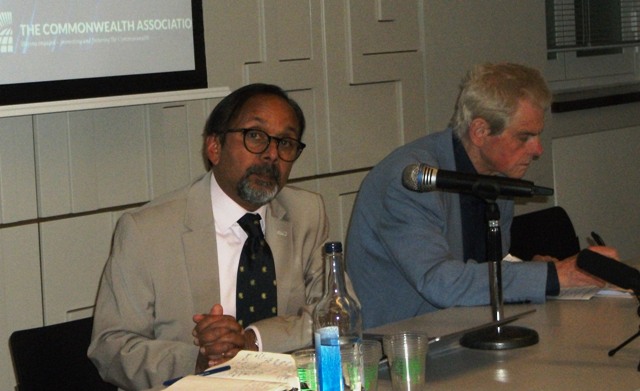 Vijay Krishnarayan and William Horsley at the panel table for session three on Values
Vijay Krishnarayan and William Horsley at the panel table for session three on Values
The twice-postponed Kigali Commonwealth summit is now due to take place in the week beginning 20 June 2022. The leaders’ debate is likely to be lively. Can the significant decline in resources be reversed and new relevance and impact be restored to the Commonwealth’s programmes? With a hotly-contested election for the post of Secretary-General under way, a controversial Chair-in-Office, and Prince Charles assuming a greater role in representing the Head, will the Commonwealth have the leadership necessary for future challenges? With recurrent questions about Rwanda’s commitment to human rights and controversy about how Commonwealth nations should treat refugees and migrants, is the association doing enough to maintain its values? And can the Commonwealth’s networks sustain it as a relevant soft power organisation for the twenty-first century, given the current turbulence in international relations following Russia’s invasion of Ukraine?
Is the Commonwealth working? This was the theme of a pre-CHOGM [Commonwealth Heads of Government Meeting] discussion held on 27 May at the Institute of Commonwealth Studies, University of London.
This event, which included in-person and virtual panellists and audiences, was organised by The Round Table: The Commonwealth Journal of International Affairs and the Institute of Commonwealth Studies, in partnership with the Commonwealth Foundation and the Commonwealth Association.
SESSION 3: Values
Former Commonwealth Foundation Director-General Vijay Krishnarayan chaired the session on values. His panel consisted of the Professor of Constitutional Governance and Politics at the University of the West Indies, Cave Hill campus, Cynthia Barrow-Giles, Commonwealth Journalists Association executive member and former BBC foreign correspondent, William Horsley, and Director of the Commonwealth Human Rights Association’s London office, Sneh Aurora.
Mr Krishnarayan began the session by saying that he had a passion for the institution but that ten years after the adoption of the Commonwealth Charter, “the Commonwealth needed to live up to its values.”
Prof Barrow-Giles said that the Commonwealth Charter had codified the values of the Commonwealth but that member governments could still undermine the Charter’s values without repercussions. Indeed, even the Chair-in-Office was doing so in the British Virgin Islands. She questioned whether the Commonwealth was “walking the talk” on the Charter and its principles. She also pointed to the “silence of the Commonwealth” on key issues. “It did too much on elections but not enough on parliaments or issues of human sexuality.” It was, however, “one of the loudest voices championing small states.”
CJA’s William Horsley said the Commonwealth was being killed by “courtesy and deference”. He said that, while media freedom and freedom of expression had become big issues at other multilateral organisations, and in a context where media freedom was under attack in many Commonwealth countries, the Commonwealth had been “not just missing a trick but absent without leave”. “Why is the Commonwealth absent from the debate about media freedom?”, he asked.
CHRI’s Sneh Aurora said that human rights more generally were under threat across the Commonwealth. As well as media freedom she raised concerns about political persecution, attacks on the rule of law, and modern slavery. The Commonwealth’s human rights were embedded in shared values. She called on the Commonwealth to “operationalise” its policies and principles and spoke of the “institutional reluctance” to follow things through.
View the session on Values:
[Filming and video by David Aitken-Smith and Melissa Aitken-Smith.
Text and photos by Debbie Ransome.]
View the opening and session one on Networks
View session two on Leadership
View session four on Programmes
Related articles:
Rwanda and CHOGM 2020 – Round Table Journal
CHOGM diary 2010 – Round Table Journal
CHOGM diary Sri Lanka – Round Table Journal 2014
CHOGM 2008: Notes from a CHOGM novice – Round Table Journal



